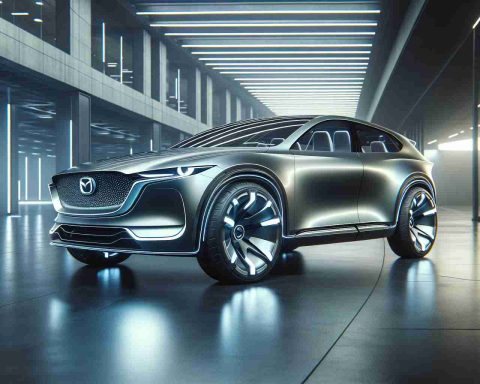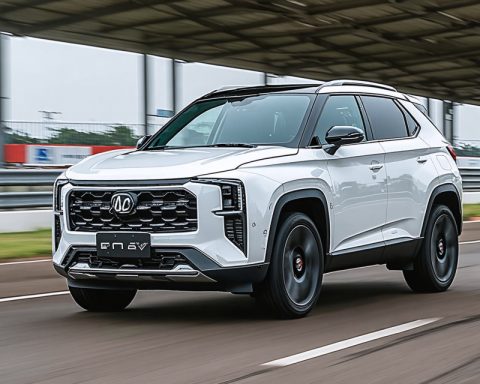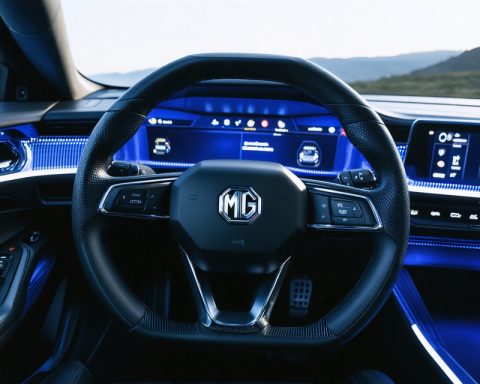- Porsche embarks on an innovative EV battery recycling initiative, focusing on reclaiming critical raw materials.
- Through a mechanical shredding process, retired batteries are converted into “black mass,” rich in nickel, cobalt, manganese, and lithium.
- A multi-phase pilot project has already produced 65 tonnes of “black mass” for further refinement.
- Porsche integrates recycled content into new battery cells, maintaining high standards of quality and performance.
- This initiative aligns Porsche with anticipated EU regulations on recycled content and traceability by 2031.
- The project highlights Porsche’s commitment to sustainability, environmental stewardship, and a circular economy, mitigating environmental impacts and raw material market volatility.
- Porsche’s approach showcases leadership in sustainable innovation, reshaping the role of automotive waste in a circular future.
Beneath the sleek contours and finely-tuned engines of Porsche’s renowned vehicles lies a profound commitment to environmental stewardship. As the world hurtles towards electrification, Porsche has boldly embarked on a captivating initiative, transforming the disposal of electric vehicle (EV) batteries into a cutting-edge recycling venture.
In the heart of Porsche’s latest endeavor lies the desire to reclaim and repurpose critical raw materials, a testament to the company’s foresight in addressing both environmental and geopolitical challenges that loom on the horizon. This initiative, a multi-phase pilot project, cleverly converts retired EV batteries into valuable resources through a sophisticated mechanical shredding process. The result is the creation of “black mass,” a granular form teeming with elements like nickel, cobalt, manganese, and lithium—essential ingredients for the high-performing batteries that power the vehicles of tomorrow.
A staggering 65 tonnes of this “black mass” has already emerged from test vehicles, setting the stage for further separation and refinement. Porsche’s dedication goes beyond simple recycling; it emphasizes the purification of these materials to meet its rigorous standards of quality and performance. This meticulous attention to detail ensures that the recycled elements will retain the high performance that Porsche’s drivers expect.
In its forward-thinking approach, Porsche plans to roll out new battery cells containing a specified amount of recycled content. These cells will undergo stringent testing in future vehicle models, standing as a testament to the automaker’s unyielding commitment to a circular economy—an initiative that is both forward-looking and deeply rooted in environmental consciousness.
Barbara Frenkel, an executive board member for Procurement, highlights the monumental significance of this undertaking, underscoring how it anchors Porsche’s commitment to sustainability. This approach not only mitigates environmental impacts but also shields Porsche against the volatility of the raw material market, potentially disrupted by geopolitical unrest.
Moreover, Porsche’s current moves position it ahead of imposing EU regulations anticipated by 2031, which will mandate increased recycled content and stringent traceability in battery production. By advancing its recycling strategy, Porsche demonstrates adaptability and leadership in the evolving landscape of automotive manufacturing.
Through this initiative, Porsche crafts a narrative that is both a technological feat and an environmental pledge. It redefines the potential of waste, showcasing how yesterday’s discarded materials can become tomorrow’s treasure—an idea that resonates deeply with a world eager for sustainable innovation. As Porsche paves the way for a circular future, the transformation of EV batteries stands as a beacon of hope and ingenuity in the pursuit of a more sustainable planet.
Unlocking the Future: Porsche’s Groundbreaking EV Battery Recycling Initiative
Porsche’s Leadership in Sustainable Innovation
Porsche, a name synonymous with luxury and performance, is steering towards sustainability with an inventive approach to recycling electric vehicle (EV) batteries. This initiative not only exemplifies Porsche’s commitment to environmental stewardship but also aligns with the global shift towards electrification.
Comprehensive Insights on Porsche’s Recycling Process
Porsche’s recycling initiative focuses on reclaiming essential raw materials from retired EV batteries. The process involves mechanical shredding, resulting in “black mass,” a material rich in nickel, cobalt, manganese, and lithium. These are pivotal components for constructing high-performance batteries.
How the Process Works:
1. Collection: Retired EV batteries are gathered from various sources, including test vehicles.
2. Mechanical Shredding: Batteries are shredded mechanically to separate the components.
3. Creation of Black Mass: The shredding results in black mass, containing valuable raw materials.
4. Material Purification: Advanced techniques are applied to purify these materials to meet Porsche’s quality standards.
5. Testing and Production: Recycled materials are incorporated into new battery cells, which undergo rigorous testing.
Meeting EU Regulations and Market Demands
Porsche’s initiative positions the company ahead in complying with upcoming EU regulations anticipated by 2031. These regulations will require higher recycled content and traceability in battery production. By proactively addressing these stipulations, Porsche not only enhances its sustainability credentials but also stabilizes its supply chain amid volatile geopolitical and market conditions.
Industry Trends and Future Predictions
– Global Shift to Electrification: According to BloombergNEF, EV sales are expected to rise sharply, reaching 50% of total car sales by 2040.
– Recycling Market Growth: The global battery recycling market is anticipated to expand at a compound annual growth rate (CAGR) of over 8% from 2021 to 2028.
Potential Challenges and Limitations
While Porsche’s initiative is impressive, there are challenges, including:
– Technological Barriers: Achieving high purity levels in recycled materials can be technologically demanding.
– Cost Implications: The recycling process might involve substantial initial investment.
Benefits of Porsche’s Recycling Initiatives
– Environmental Impact: Reduces dependency on mining and minimizes environmental degradation.
– Economic Stability: Shields against fluctuations in raw material prices.
– Consumer Confidence: Aligns with increasing consumer demand for sustainable products.
Practical Recommendations for Consumers
– Stay Informed: Keep up with automaker advancements in sustainability.
– Consider Sustainability: When purchasing a vehicle, weigh the manufacturer’s sustainability practices.
Conclusion: Driving a Sustainable Future
Porsche’s EV battery recycling initiative offers a revolutionary blueprint for the automotive industry. By converting waste into valuable resources, Porsche not only pushes the envelope of technological innovation but also strengthens its commitment to a circular economy.
For more information on Porsche’s sustainability efforts, visit the main domain Porsche.























